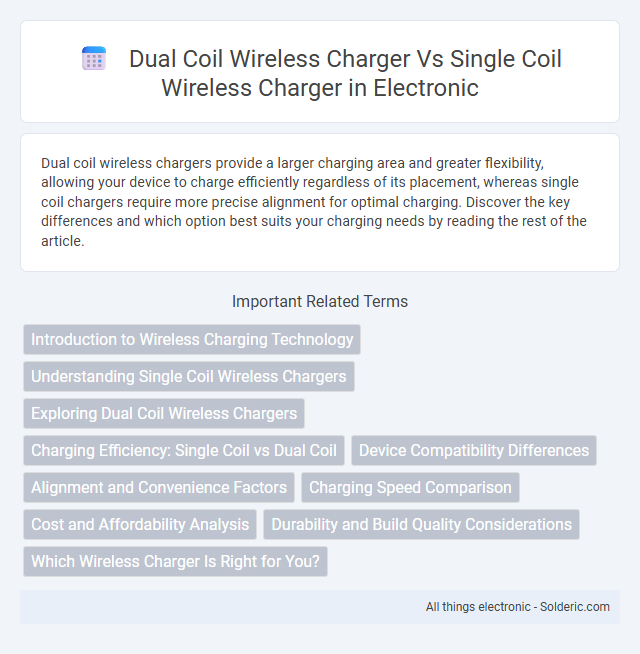Dual coil wireless chargers provide a larger charging area and greater flexibility, allowing your device to charge efficiently regardless of its placement, whereas single coil chargers require more precise alignment for optimal charging. Discover the key differences and which option best suits your charging needs by reading the rest of the article.
Comparison Table
| Feature | Dual Coil Wireless Charger | Single Coil Wireless Charger |
|---|---|---|
| Charging Area | Large, covers more surface for flexible device placement | Small, requires precise alignment for optimal charging |
| Charging Speed | Generally faster due to better alignment | Slower if not perfectly aligned |
| Compatibility | Works with more devices, supports various sizes | Limited to smaller devices or exact coil positions |
| Device Heating | Lower heat generation due to efficient power transfer | Can generate more heat if misaligned |
| Cost | Higher price point due to complexity | More affordable and simpler design |
| Usage Convenience | More user-friendly, less worry about placement | Needs precise placement for charging to start |
Introduction to Wireless Charging Technology
Wireless charging technology utilizes electromagnetic fields to transfer energy between a charging pad and your device without the need for cables. Dual coil wireless chargers feature two overlapping coils that expand the charging area, allowing for more flexible device placement and faster charging compared to single coil chargers. Single coil chargers require precise alignment for optimal performance, while dual coil designs improve efficiency and convenience by reducing misalignment issues.
Understanding Single Coil Wireless Chargers
Single coil wireless chargers use a single induction coil to transfer power, which requires precise alignment between your device and the charger for optimal performance. These chargers are typically more compact and affordable, but their limited charging surface can result in slower or less efficient charging if your device is misaligned. Understanding the mechanics of single coil wireless chargers helps you make an informed choice for your charging needs, especially if you prioritize simplicity and budget.
Exploring Dual Coil Wireless Chargers
Dual coil wireless chargers offer enhanced charging efficiency by covering a larger surface area, allowing devices to charge seamlessly without precise alignment. Unlike single coil chargers that require exact positioning, dual coil models provide greater flexibility and convenience for users with multiple device types. Advanced dual coil technology also supports faster charge times and improved energy transfer, making it ideal for modern smartphones and wearable devices.
Charging Efficiency: Single Coil vs Dual Coil
Dual coil wireless chargers provide higher charging efficiency and better alignment flexibility compared to single coil chargers, reducing power loss during charging. Single coil chargers may experience slower charging speeds due to limited coil coverage, requiring precise device placement to maintain optimal energy transfer. Your device benefits from dual coil technology by achieving faster and more consistent wireless charging performance.
Device Compatibility Differences
Dual coil wireless chargers offer enhanced device compatibility by supporting a wider range of phone orientations and sizes, enabling efficient charging for various smartphones, including larger models and cases with metal components. Single coil chargers typically require precise alignment between the device and charging pad, limiting compatibility to devices that fit specific coil dimensions and placement. The dual coil design reduces compatibility issues by providing a larger charging area, accommodating diverse device shapes and orientations without sacrificing charging speed or efficiency.
Alignment and Convenience Factors
Dual coil wireless chargers provide enhanced alignment flexibility, allowing your device to charge effectively without precise positioning, unlike single coil chargers which require exact placement for optimal charging. The convenience of dual coil chargers lies in their larger charging area and ability to support multiple device orientations, ensuring your phone begins charging quickly and reliably. Choosing a dual coil wireless charger reduces the hassle of constantly adjusting your device, improving your overall wireless charging experience.
Charging Speed Comparison
Dual coil wireless chargers generally offer faster charging speeds compared to single coil chargers due to their ability to align better with your device's charging receiver, reducing energy loss. The increased coil coverage in dual coil chargers enables more efficient power transfer, minimizing interruptions and heat generation. You can expect a noticeable improvement in charging times, especially when your device isn't perfectly aligned with the charger's surface.
Cost and Affordability Analysis
Dual coil wireless chargers typically cost more than single coil chargers due to the additional materials and more complex design, impacting affordability for budget-conscious consumers. Single coil chargers offer a more cost-effective solution with simpler manufacturing processes, making them widely accessible for everyday use. Consumers prioritizing price often choose single coil models, while those seeking enhanced charging flexibility may invest in higher-priced dual coil options.
Durability and Build Quality Considerations
Dual coil wireless chargers often feature enhanced durability and build quality due to their more complex design and higher-grade materials, allowing for better heat dissipation and extended lifespan during frequent use. Single coil wireless chargers typically have a simpler construction, which may reduce production costs but can compromise durability under heavy or prolonged charging conditions. Choosing your wireless charger involves evaluating the build quality to ensure long-term reliability, especially if you rely on fast and consistent wireless power delivery.
Which Wireless Charger Is Right for You?
Dual coil wireless chargers provide a wider charging area, allowing greater flexibility in device placement and reducing alignment issues common with single coil chargers. Single coil wireless chargers offer a more compact design and are typically more affordable, making them suitable if you have a designated charging spot and minimal device movement. Your choice depends on whether you prioritize convenience and flexibility or cost and compactness for your charging needs.
Dual coil wireless charger vs single coil wireless charger Infographic

 solderic.com
solderic.com